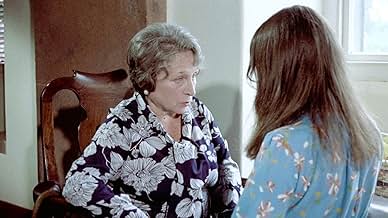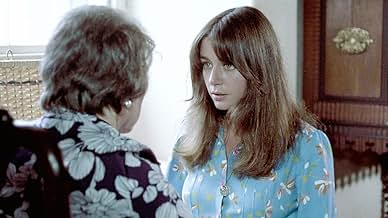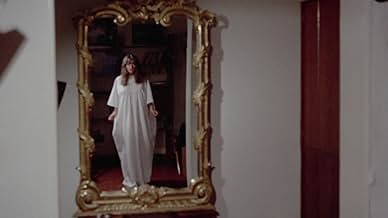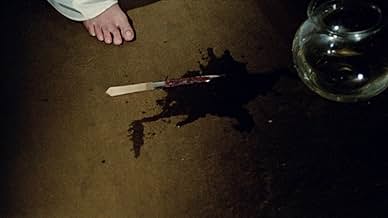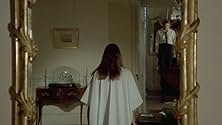Una cantante de un club nocturno es perseguida por el fantasma de su difunto padre. El muerto la convoca a través de un espejo, obligándola a cometer una serie de crímenes violentos.Una cantante de un club nocturno es perseguida por el fantasma de su difunto padre. El muerto la convoca a través de un espejo, obligándola a cometer una serie de crímenes violentos.Una cantante de un club nocturno es perseguida por el fantasma de su difunto padre. El muerto la convoca a través de un espejo, obligándola a cometer una serie de crímenes violentos.
- Dirección
- Guión
- Reparto principal
- Premios
- 1 premio en total
Robert Woods
- Bill
- (as Robert Wood)
Françoise Brion
- Carla
- (as Francoise Brion)
Alice Arno
- Tina
- (as Alice Arnó)
María Bassó
- Elvira
- (as Maria Bassó)
Ada Tauler
- Stefania
- (as Adela Tauler)
Chantal Broquet
- Angela
- (sin acreditar)
Carmen Carbonell
- Tante
- (sin acreditar)
Jesús Franco
- Roger
- (sin acreditar)
Nicole Guettard
- Gloria
- (sin acreditar)
Monica Swinn
- Marie's Girlfriend (French version only)
- (sin acreditar)
Reseñas destacadas
Obscene Mirror (1973)
*** (out of 4)
This is a pretty well, if highly praised, film from the Spanish director, which is (apparently) available in three different versions. The version getting all the love and praise is the Spanish version while the French and Italian versions are re-edited with hardcore scenes and an alternate cast added to the mix. The version I watched was the Italian one, which is hard to review due to the hardcore scenes, which were added. The basic plot, I believe, is the same from each version and centers on a woman (Emma Cohen) who suffers a breakdown after the suicide of her sister (played by Lina Romay in this version). Soon after the suicide the sister begins to see her dead sister inside a mirror, which causes her to go out, bring men home and kill them. Again, it's really hard to judge this film due to the added scenes and the fact that the Spanish version is apparently totally different but there was enough here to I loved to recommend people seeing this but at the same time you should certainly try and get the original version (which I will be looking for). The film reminded me a lot of Franco's Venus in Furs, which is among the director's best films. There's a deeply haunting, sad and tragic nature and atmosphere, which runs throughout this film and it wasn't hard to get caught up into the mental state of the main character. Franco's direction is very sharp throughout but most of the credit has to go towards Cohen who is simply terrific in the film. She doesn't have to resort to nudity or cheap thrills to get her performance across. I guess the best way to explain it is that she comes across like a spirit and just floats from one scene to the next, slowing breaking down in front of our eyes. Sadly the disc I watched also didn't feature any subtitles so I couldn't follow any of the dialogue, which there was plenty of and I'm sure if I could follow the story more I would have loved it even more. The hardcore scenes, which again, were added, are pretty ugly and add absolutely nothing to the movie. These scenes really killed everything that was going on so I found myself hitting the FF button through them. I'm hoping to track down the director's cut soon since most fans think this Italian version is a complete mess. If it is a mess and I enjoyed it this much then I can't wait to see what the Spanish one offers.
*** (out of 4)
This is a pretty well, if highly praised, film from the Spanish director, which is (apparently) available in three different versions. The version getting all the love and praise is the Spanish version while the French and Italian versions are re-edited with hardcore scenes and an alternate cast added to the mix. The version I watched was the Italian one, which is hard to review due to the hardcore scenes, which were added. The basic plot, I believe, is the same from each version and centers on a woman (Emma Cohen) who suffers a breakdown after the suicide of her sister (played by Lina Romay in this version). Soon after the suicide the sister begins to see her dead sister inside a mirror, which causes her to go out, bring men home and kill them. Again, it's really hard to judge this film due to the added scenes and the fact that the Spanish version is apparently totally different but there was enough here to I loved to recommend people seeing this but at the same time you should certainly try and get the original version (which I will be looking for). The film reminded me a lot of Franco's Venus in Furs, which is among the director's best films. There's a deeply haunting, sad and tragic nature and atmosphere, which runs throughout this film and it wasn't hard to get caught up into the mental state of the main character. Franco's direction is very sharp throughout but most of the credit has to go towards Cohen who is simply terrific in the film. She doesn't have to resort to nudity or cheap thrills to get her performance across. I guess the best way to explain it is that she comes across like a spirit and just floats from one scene to the next, slowing breaking down in front of our eyes. Sadly the disc I watched also didn't feature any subtitles so I couldn't follow any of the dialogue, which there was plenty of and I'm sure if I could follow the story more I would have loved it even more. The hardcore scenes, which again, were added, are pretty ugly and add absolutely nothing to the movie. These scenes really killed everything that was going on so I found myself hitting the FF button through them. I'm hoping to track down the director's cut soon since most fans think this Italian version is a complete mess. If it is a mess and I enjoyed it this much then I can't wait to see what the Spanish one offers.
Here is another of those elusive Franco films that in its proper context is neither horror, nor porn or sexploitation, in spite of the hardcore inserts, but wandering around urges.
Now I appreciate Franco in the way you do with a friend or co-worker you have known forever. I appreciate him, in part, because of how familiar his flaws and habits. So I won't mollycoddle him or pretend in his face: he was often sloppy, charmless as a thinker and embarrassing in a number of ways. Whereas some fans read profundity in this film, for me all the stuff about mirrors, madness and theater as staged inner life are as sophomoric as it gets, for instance that whispers of a damaged mind will issue from a mirror.
Let me say here that it's not the elements themselves, which others like Rivette, Resnais and Ruiz have used to similar effect, but the narrative distance they are placed away from the viewer, distance that leads up to them and away from.
But I accept it as part of the experience of shared intuition that is possible with a good friend; Franco is worth knowing because, going past conscious narrative impositions, I can relax in a fluid fabric of images which he seems to spontaneously stir up from life as he walks through it. The more of his films I watch, the more I relax because I have shared in previous travels.
It's all in the last scene here.
Leading up to it we have obviously layered madness about a woman reliving guilt from her past, inserts of incestual cunnilingus and hardcore sex (in the Italian version I saw), and relaxed wandering around bars and later exotic Madeira. As a whole the film evokes Franco's films with Soledad, She Killed in Ecstasy and Eugenie. It is not as 'pure' as Female Vampire, nor on the other hand as testing.
The idea, tremendously simple, is that a woman wanted to get married, but her beloved sister killed herself out of desperation and perhaps spurned love, and she carries this burden in unfulfilled affairs with men.
The Spanish version without the inserts may flesh out the story a bit more, but story is not the main point, it's swimming across to where images acquire life of their own.
In the last scene we have all this, the wandering, madness, and repressed emotion, coalesce together in a beautiful way as a bridal veil fluttering in the wind.
Now I appreciate Franco in the way you do with a friend or co-worker you have known forever. I appreciate him, in part, because of how familiar his flaws and habits. So I won't mollycoddle him or pretend in his face: he was often sloppy, charmless as a thinker and embarrassing in a number of ways. Whereas some fans read profundity in this film, for me all the stuff about mirrors, madness and theater as staged inner life are as sophomoric as it gets, for instance that whispers of a damaged mind will issue from a mirror.
Let me say here that it's not the elements themselves, which others like Rivette, Resnais and Ruiz have used to similar effect, but the narrative distance they are placed away from the viewer, distance that leads up to them and away from.
But I accept it as part of the experience of shared intuition that is possible with a good friend; Franco is worth knowing because, going past conscious narrative impositions, I can relax in a fluid fabric of images which he seems to spontaneously stir up from life as he walks through it. The more of his films I watch, the more I relax because I have shared in previous travels.
It's all in the last scene here.
Leading up to it we have obviously layered madness about a woman reliving guilt from her past, inserts of incestual cunnilingus and hardcore sex (in the Italian version I saw), and relaxed wandering around bars and later exotic Madeira. As a whole the film evokes Franco's films with Soledad, She Killed in Ecstasy and Eugenie. It is not as 'pure' as Female Vampire, nor on the other hand as testing.
The idea, tremendously simple, is that a woman wanted to get married, but her beloved sister killed herself out of desperation and perhaps spurned love, and she carries this burden in unfulfilled affairs with men.
The Spanish version without the inserts may flesh out the story a bit more, but story is not the main point, it's swimming across to where images acquire life of their own.
In the last scene we have all this, the wandering, madness, and repressed emotion, coalesce together in a beautiful way as a bridal veil fluttering in the wind.
For years and years, I fanatically defended the work of writer/director Jess Franco, but with every film of his that I watch, I wonder why I ever bothered. Maybe I should accept the fact Franco only made a handful of influential and genuine exploitation classics ("The Awful Dr. Orloff", "The Diabolical Dr. Z", "Faceless"), whereas the vast majority of his excessively large repertoire is just utter garbage.
And yet, for a good 15-20 minutes, it really seemed as if "The Obscene Mirror" would become another Franco-winner! The first quarter is definitely promising, with the introduction of a widower (Franco-regular Howard Vernon) and his two beautiful daughters Annette and Marie. Annette is head over heels in love with archeology student Arthur, but Marie is so jealous of her sister's happiness that she commits suicide by ramming a sword in her stomach one day before the wedding. Following the tragedy, Annette is so confused that she abruptly calls off her wedding and starts a new life as piano player in a raunchy bar. From this moment on, Annette hears and sees her sister appearing in an antique mirror, and Marie's vengeful spirit commands her to brutally slaughter every man she's sexually attracted to.
At least, this is the plot of the version I watched, because - apparently - there also exists a version in which it's Annette's father who commits suicide and commands her to kill. Oh well, just another typical flick in Jess Franco's bizarre universe.
With the exception of the compelling first 15 minutes, "The Obscene Mirror" is a dreadfully boring and frustrating film. Franco reverts to his bad habit of inserting overlong (and very un-sexy) hardcore footage, which absolutely doesn't have any added value. During countless of times during the film, you'll find yourself staring at extreme close-ups of a vagina (probably Lina Romay's), and listening to the sounds of either monotonous moaning or jazzy musical tunes. I don't know which of the two was more irritating.
For some strange reason I will never comprehend, "The Obscene Mirror" - in whatever version - is regarded as one of Franco's finest films, and this also gets confirmed by most of the user-comments on this website. Maybe it's fanstastic if endless close-ups of female genitalia are your thing, but it seems to me there are more effective channels for that.
And yet, for a good 15-20 minutes, it really seemed as if "The Obscene Mirror" would become another Franco-winner! The first quarter is definitely promising, with the introduction of a widower (Franco-regular Howard Vernon) and his two beautiful daughters Annette and Marie. Annette is head over heels in love with archeology student Arthur, but Marie is so jealous of her sister's happiness that she commits suicide by ramming a sword in her stomach one day before the wedding. Following the tragedy, Annette is so confused that she abruptly calls off her wedding and starts a new life as piano player in a raunchy bar. From this moment on, Annette hears and sees her sister appearing in an antique mirror, and Marie's vengeful spirit commands her to brutally slaughter every man she's sexually attracted to.
At least, this is the plot of the version I watched, because - apparently - there also exists a version in which it's Annette's father who commits suicide and commands her to kill. Oh well, just another typical flick in Jess Franco's bizarre universe.
With the exception of the compelling first 15 minutes, "The Obscene Mirror" is a dreadfully boring and frustrating film. Franco reverts to his bad habit of inserting overlong (and very un-sexy) hardcore footage, which absolutely doesn't have any added value. During countless of times during the film, you'll find yourself staring at extreme close-ups of a vagina (probably Lina Romay's), and listening to the sounds of either monotonous moaning or jazzy musical tunes. I don't know which of the two was more irritating.
For some strange reason I will never comprehend, "The Obscene Mirror" - in whatever version - is regarded as one of Franco's finest films, and this also gets confirmed by most of the user-comments on this website. Maybe it's fanstastic if endless close-ups of female genitalia are your thing, but it seems to me there are more effective channels for that.
As most know, there are 3 versions of the film. The Spanish is considered to be the true director's cut. The French changes the plot and swaps actors, while an Italian print adds hardcore bits to the newly added sex scenes from the French version. While it is frequently cited that the material in the French and Italian films were shot later, this is not entirely true. The Lina Romay footage was lensed later, but there are 3 extended nude scenes with Emma Cohen that were from the initial shoot, and I believe Franco would want them in any 'director's cut' DVD that will hopefully appear. They can easily be edited back into the Spanish print ( I've made myself a copy for future viewings ). Are the nude scenes essential to the plot, well perhaps not. But knowing how Franco adores the female form, coupled with Cohen's beautiful presence....I'd strongly feel he wanted them in the Spanish cut but was prevented by the strict censorship of the Spain at the time.
This average-budget film contains thrills , a criminal intrigue and various murders . It's a passable slasher movie directed by prolific filmmaker Jess Frank concerning a nightclub singer is haunted by the ghost of her late dad . Anetta(Emma Cohen) is a pianist in cabarets and nightclubs , she's very close to her widower father (Howard Vernon) after their mother's death . Anetta suffers a tragedy on the eve of her wedding to Arturo (Wal Davis) , as his father is extremely opposed to this marriage , that's why he commits suicide by hanging . Later on , the dead man summons her through a mirror , forcing her to commit a series of violent crimes . This becomes a nightmare for her when she starts seeing him in all the mirrors making signs.
Austerily slasher film revolving around an unsettling , deranged young woman who suffered an emotional crisis that is torn between death and pain expressed in the reflection of the windows . It contains thrills , chills , haunting poetic fantasy , nudism and grisly killings . Here Franco manages to give us an adequate ambient , evocative production design , being regularly narrated , including a murders plot enough to keep you intrigued throughout the flick . In this passable as well as eerie yarn , Franco established his ordinary poetic and visually striking style . There are other versions in which Annette and Mary are sisters , and the latter haunting Annette on the mirror and another hardcore retelling with Lina Romay , Franco's muse , playing the erotic scenes , as usual . Emma Cohen gives a decent acting as singer/pianist Ana who will kill all men who feels sexually attracted to her by fulfilling the wishes of the late daddy . She's well accompanied by a good cast , some of them Franco's regulars , such as : Robert Woods , Alice Arno , Françoise Brion , Philippe Lemaire , Ramiro Oliveros and Howard Vernon as the father incites her to an unprecedented massacre. And Jesus Franco or Jess Frank cameo as a pianist at a bar .
One of the slasher movies by prolific writer/producer/director Jesús Franco , one of the kings of the ¨Spanish Fantaterror¨, and considered to be one of the best films from his second period . Jesús Franco who never considered the film to be a horror story , but instead felt it was tale of "anguish". Being produced in short budget by Robert de Nesle and José María Forqué . It packs evocative cinematography by Antonio Millán, filmed on Portuguese locations in Lisbon, Madeira, Tobis Portuguesa, Lumiar, Lisbon, (studio) . Likewise, atmospheric musical score by André Bénichou and Adolfo Waitzman, including Jazzy soundtrack and catching songs . The motion picture was regular but professionally directed by Jesus Franco. However , here he doesn't use his trademarks , as he carries out a traditional narration , without excessive zooms , neither lousy pace . Jesus uses to sign under pseudonym , among the aliases he used, apart from the names Jess Franco or Franco Manera, were Jess Frank, Robert Zimmerman, Frank Hollman, Clifford Brown, David Khune , Toni Falt, James P. Johnson, Charlie Christian, David Tough , among others . Franco used to utilize usual marks such as zooms , nudism , foreground on objects , filmmaking in ¨do-it-yourself effort¨ style or DIY , double-versions , and managing to work extraordinarily quickly . In many of the more than 180 films he's directed he has also worked as composer, writer, cinematographer and editor. His first was "We Are 18 Years Old" and the second picture was ¨Gritos en la Noche¨ (1962) , the best of all them , also titled "The Awful Dr. Orlof" , it's followed by various sequels such as El Secreto del Dr. Orloff (1964) aka "The Mistresses of Dr. Jekyll" , " Orloff y el hombre invisible (1970) aka "Dr. Orloff's Invisible Monster" and finally "Faceless" (1987) . He also directed to the great Christopher Lee in 4 films : "The Bloody Judge" , ¨Count Dracula¨, ¨The Blood of Fu Manchu¨ and ¨The castle of Fu Manchu¨ . Jesús's influence has been notable all over Europe . From his huge body of work we can deduce that Jesús Franco is one of the most restless directors of Spanish cinema and often releasing several titles at the same time. Many of his films have had problems in getting released, and others have been made directly for video. More than once his staunchest supporters have found his "new" films to contain much footage from one or more of his older films . Jesús Franco is a survivor in a time when most of his colleagues tried to please the government administration. He broke up with all that and got the independence he was seeking. He always went upstream in an ephemeral industry that fed opportunists and curbed the activity of many professionals . But time doesn't pass in vain, and Jesus' production diminished since the 90s ; however he went on shooting until his death . Al otro lado del espejo (1973) rating : 5.5/10 . Mediocre but passable.
Austerily slasher film revolving around an unsettling , deranged young woman who suffered an emotional crisis that is torn between death and pain expressed in the reflection of the windows . It contains thrills , chills , haunting poetic fantasy , nudism and grisly killings . Here Franco manages to give us an adequate ambient , evocative production design , being regularly narrated , including a murders plot enough to keep you intrigued throughout the flick . In this passable as well as eerie yarn , Franco established his ordinary poetic and visually striking style . There are other versions in which Annette and Mary are sisters , and the latter haunting Annette on the mirror and another hardcore retelling with Lina Romay , Franco's muse , playing the erotic scenes , as usual . Emma Cohen gives a decent acting as singer/pianist Ana who will kill all men who feels sexually attracted to her by fulfilling the wishes of the late daddy . She's well accompanied by a good cast , some of them Franco's regulars , such as : Robert Woods , Alice Arno , Françoise Brion , Philippe Lemaire , Ramiro Oliveros and Howard Vernon as the father incites her to an unprecedented massacre. And Jesus Franco or Jess Frank cameo as a pianist at a bar .
One of the slasher movies by prolific writer/producer/director Jesús Franco , one of the kings of the ¨Spanish Fantaterror¨, and considered to be one of the best films from his second period . Jesús Franco who never considered the film to be a horror story , but instead felt it was tale of "anguish". Being produced in short budget by Robert de Nesle and José María Forqué . It packs evocative cinematography by Antonio Millán, filmed on Portuguese locations in Lisbon, Madeira, Tobis Portuguesa, Lumiar, Lisbon, (studio) . Likewise, atmospheric musical score by André Bénichou and Adolfo Waitzman, including Jazzy soundtrack and catching songs . The motion picture was regular but professionally directed by Jesus Franco. However , here he doesn't use his trademarks , as he carries out a traditional narration , without excessive zooms , neither lousy pace . Jesus uses to sign under pseudonym , among the aliases he used, apart from the names Jess Franco or Franco Manera, were Jess Frank, Robert Zimmerman, Frank Hollman, Clifford Brown, David Khune , Toni Falt, James P. Johnson, Charlie Christian, David Tough , among others . Franco used to utilize usual marks such as zooms , nudism , foreground on objects , filmmaking in ¨do-it-yourself effort¨ style or DIY , double-versions , and managing to work extraordinarily quickly . In many of the more than 180 films he's directed he has also worked as composer, writer, cinematographer and editor. His first was "We Are 18 Years Old" and the second picture was ¨Gritos en la Noche¨ (1962) , the best of all them , also titled "The Awful Dr. Orlof" , it's followed by various sequels such as El Secreto del Dr. Orloff (1964) aka "The Mistresses of Dr. Jekyll" , " Orloff y el hombre invisible (1970) aka "Dr. Orloff's Invisible Monster" and finally "Faceless" (1987) . He also directed to the great Christopher Lee in 4 films : "The Bloody Judge" , ¨Count Dracula¨, ¨The Blood of Fu Manchu¨ and ¨The castle of Fu Manchu¨ . Jesús's influence has been notable all over Europe . From his huge body of work we can deduce that Jesús Franco is one of the most restless directors of Spanish cinema and often releasing several titles at the same time. Many of his films have had problems in getting released, and others have been made directly for video. More than once his staunchest supporters have found his "new" films to contain much footage from one or more of his older films . Jesús Franco is a survivor in a time when most of his colleagues tried to please the government administration. He broke up with all that and got the independence he was seeking. He always went upstream in an ephemeral industry that fed opportunists and curbed the activity of many professionals . But time doesn't pass in vain, and Jesus' production diminished since the 90s ; however he went on shooting until his death . Al otro lado del espejo (1973) rating : 5.5/10 . Mediocre but passable.
¿Sabías que...?
- PifiasIn the end credits of the Spanish version, Françoise Brion is credited as Carla and Alice Arno is credited as Tina but in the film, it's the other way around.
- ConexionesReferenced in Franco Noir (2021)
Selecciones populares
Inicia sesión para calificar y añadir a tu lista para recibir recomendaciones personalizadas
- How long is The Other Side of the Mirror?Con tecnología de Alexa
Detalles
- Fecha de lanzamiento
- Países de origen
- Idioma
- Títulos en diferentes países
- The Other Side of the Mirror
- Localizaciones del rodaje
- Lisboa, Portugal(Exterior)
- Empresas productoras
- Ver más compañías en los créditos en IMDbPro
- Duración
- 1h 22min(82 min)
- Mezcla de sonido
- Relación de aspecto
- 1.85 : 1
Contribuir a esta página
Sugerir un cambio o añadir el contenido que falta

